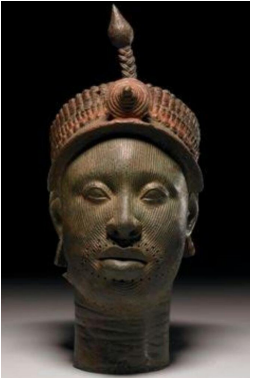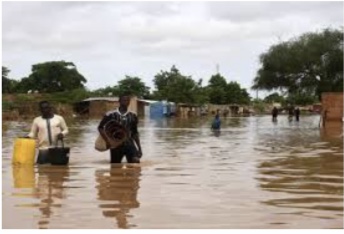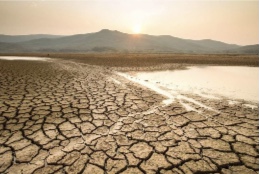Environment
The Indomitable Yoruba Spirit: A Tribute To Hard Work And Resilience

The Yoruba people have consistently demonstrated their ingenuity and prowess in various fields, building the city of Lagos through remarkable achievements. Madam Efúnróyè Tinúbú, a politically and economically powerful figure in Lagos during the 19th century, exemplifies this legacy. The landmark Tinubu Square, named after her, stands as a testament to the Yoruba legacy.
In 1805, Madam Efúnróyè Tinúbú became the first woman to buy a car. By 1848, she was a prominent figure in Lagos. The first storey building in what became Nigeria was established in Badagry, Lagos State, in 1845. The oldest secondary school in what became Nigeria, CMS Grammar School, Bariga, Lagos, was founded by the Church Missionary Society in 1859.
Lagos was a thriving trading center with a population of over 62,000 people by 1872, and imports and exports valued at £476,813 and £619,260, respectively, by 1876. The Yoruba people made significant contributions to telecommunications, establishing a Post Office in Lagos in 1852 and a submarine cable link between Lagos and London in 1856.
The city of Lagos has a rich cultural heritage, with the first film shown in what became Nigerian theaters in Glover Memorial Hall in Lagos in 1903. The oldest stadium in Nigeria, Onikan Stadium, was built in 1930 and renamed Mobolaji Johnson Arena in 2019. Many notable figures in the music industry have emerged from Lagos, including Abibu Oluwa and King Sunny Ade, the first African to be nominated twice for a Grammy Award.
The Yoruba legacy in Lagos is a testament to their hard work, resilience, and determination. As we celebrate their achievements, we honor the memory of those who came before us and paved the way for our success.
Notable achievements include:
— 1805: Madam Efúnróyè Tinúbú becomes the first woman to buy a car. — 1845: The first storey building in what became Nigeria is established in Badagry, Lagos State. — 1848: Madam Efúnróyè Tinúbú becomes a prominent figure in Lagos. — 1852: A Post Office is established in Lagos. — 1856: A submarine cable link between Lagos and London is commissioned. — 1859: CMS Grammar School, Bariga, Lagos, is founded. — 1872: Lagos becomes a thriving trading center. — 1876: Imports and exports are valued at £476,813 and £619,260, respectively. — 1886: Telecommunications start in Lagos. — 1893: Offices in Lagos, Jebba, and Ilorin are provided with telephone services. — 1894: The first bank in what became Nigeria, First Bank, is established in Lagos. — 1903: The first film is shown in what became Nigerian theaters. — 1913: Olayinka Herbert Macaulay becomes the first Nigerian to own a car. — 1923: The Nigerian Electricity Supply Company is established. — 1930: Onikan Stadium is built and later renamed Mobolaji Johnson Arena in 2019. — 1952: Akintola Williams becomes the first chartered accountant. — 1958: Sir Adetokunbo Adegboyega Ademola becomes the first indigenous Chief Justice. — 1964: Late Chief SL Akintola imports the first bulletproof car into Nigeria. — 1970: Fela Anikulapo Kuti lays the foundation for Afrobeat. — 1977: Superstar American musicians Steve Wonder and James Brown land in Lagos for FESTAC.
Environment
Nigeria Introduces National Flood Insurance Policy to Mitigate Flood Impact

The Federal Government of Nigeria has taken a significant step towards mitigating the impact of flood disasters with the adoption of the National Flood Insurance Policy (NFIP).
Announced on June 26, 2025, in Abuja, the policy aims to provide a financial safety net for individuals, businesses, and communities affected by flood-related disasters.
The NFIP will provide financial protection to individuals, businesses, and communities, enabling swift recovery from flood-induced losses and ensuring long-term resilience.
This proactive approach to flood risk management emphasizes preparedness and mitigation over reactive responses.
The policy advocates for standalone flood insurance policies, which offer clearer and more comprehensive protection, promote better risk management, and support disaster recovery efforts.
The national framework will guide the implementation of a robust and inclusive flood insurance system, protecting vulnerable populations, supporting rapid post-flood recovery, and enhancing national resilience.
A technical committee has been tasked with developing the National Flood Insurance Policy and Implementation Framework, defining clear timelines, assigning responsibilities, and developing monitoring mechanisms to ensure effective implementation.
However, challenges such as inadequate infrastructure, lack of inter-agency coordination, and cultural barriers may hinder the policy’s success.
The adoption of the National Flood Insurance Policy is a significant step towards building resilience in Nigeria.
By providing a financial safety net and promoting proactive flood risk management, the policy has the potential to reduce the economic and human toll of recurring floods.
As Nigeria embarks on this journey, it is essential to address the challenges and ensure effective implementation to secure a more resilient future for its citizens.
The policy will be implemented in collaboration with relevant stakeholders, including the National Insurance Commission (NAICOM), Nigerian Meteorological Agency (NiMet), and leading underwriters.
The NFIP will offer structured coverage for residential properties, commercial enterprises, agricultural investments, and public infrastructure, with subsidized premiums to make it affordable for low-income households and vulnerable small businesses.
Environment
Africa’s Nuclear Dilemma: Risks and Benefits Weighed
As Africa navigates the challenges of climate change, energy poverty, and sustainable development, a growing number of nations are considering nuclear energy as part of their energy mix.
However, critics warn of the dangers of nuclear power, citing risks to human health, the environment, and the high upfront costs of building nuclear power plants.
Thirteen African countries, including Angola, Burkina Faso, Egypt, Ethiopia, Ghana, Kenya, Morocco, Namibia, Nigeria, Senegal, Tanzania, Rwanda, and Uganda, plan to roll out nuclear power plants.
Proponents argue that nuclear energy can provide reliable and constant electricity, driving industrialization and economic growth.
Critics argue that renewable energy sources, such as solar, wind, hydro, and geothermal power, are cleaner, safer, and more cost-effective.
Africa has an abundance of renewable energy resources that can be harnessed to generate electricity.
Many African countries are already investing in renewable energy projects with promising results.
A report by 12 civil society organizations warns against the dangers of nuclear energy, citing its slow delivery, high costs, and risks to human health and the environment.
The authors call for an end to plans to spend billions on building new nuclear power plants, arguing that funding could be better spent on renewable energy projects.
As Africa weighs the benefits and risks of nuclear energy, prioritizing clean, safe, and sustainable energy solutions is essential.
Renewable energy sources offer a viable alternative to nuclear power, providing a cleaner, safer, and more cost-effective way to generate electricity.
Environment
Rising Threats: Morocco Faces Unprecedented Climate Challenges

Morocco has emerged as one of North Africa’s most climate-vulnerable countries, according to the World Meteorological Organisation’s 2024 “State of the Climate in Africa” report.
The kingdom faces escalating threats, including prolonged droughts, rising temperatures, erratic rainfall, and flash floods that have caused heavy human and material losses.
Environmental expert, Mostapha Aissat, described recent climate events in Morocco as “unprecedented in the country’s history,” citing seven consecutive years of drought and destructive floods across the south and southeast.
The 2022 wildfires that devoured over 20,000 hectares of forest, severely impacting biodiversity and agriculture, are a stark reminder of the country’s vulnerability to climate-related disasters.
Aissat warned that two global indicators suggest worsening conditions: global warming and the continued failure of major polluting nations to halve CO₂ emissions by 2030, as outlined in the Paris Agreement.
He also noted the rising risk of natural disasters beyond climate change, such as earthquakes, referencing Morocco’s 2023 Al Haouz quake.
Climate expert, Ali Cherroud, added that Morocco’s geography, from mountains to coasts to deserts, makes it uniquely exposed to a wide spectrum of seasonal and non-seasonal disasters.
The country’s position at the intersection of cold, humid northern currents and hot, dry southern flows intensifies its susceptibility to extremes.
Cherroud welcomed the newly announced National Natural Disaster Centre in the Rabat-Salé-Kénitra region, calling it a “proactive shift” in disaster management and urging its replication across Morocco.
He emphasized the need for a national roadmap based on early warning, rapid response, and risk forecasting to shield lives and assets.
With converging international assessments and on-the-ground observations, experts say climate preparedness is no longer optional – it is Morocco’s new strategic imperative.
The country must take a proactive approach to disaster management, investing in early warning systems, rapid response mechanisms, and risk forecasting to mitigate the impacts of climate-related disasters.
-

 News6 days ago
News6 days agoNigeria’s Consul General in New York Receives Diaspora Watch Publisher, Boniface Ihiasota
-

 News1 week ago
News1 week agoPutin Condemns U.S. Strikes on Iran, Warns of Escalating Global Danger
-
Features6 days ago
Guyana, CDF Sign US$18m Agreement for Agricultural Development
-

 Business6 days ago
Business6 days agoEU, Liberia Sign €25m Agreement to Boost Private Sector Development
-

 News1 week ago
News1 week agoIsrael Bombs Iran’s Evin Prison as U.S. Joins Conflict: Tensions Soar in Middle East
-

 Milestone6 days ago
Milestone6 days agoAisha Braveboy Sworn in as Prince George’s County Executive, Appoints New Police Chief












